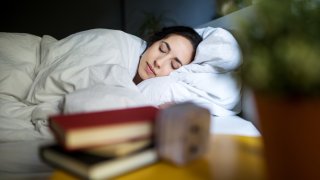
After "springing forward" an hour Sunday morning, experts provided tips to maintaining productivity and a healthy sleep schedule in days following the switch to daylight saving time.
Daylight saving time begins at 2 a.m. Sunday morning, requiring many people to turn their clocks forward an hour before going to sleep Saturday night.
Going into Sunday morning, people will likely lose an hour of sleep as the sun will start to both rise and set at a later time, according to the National Weather Service.
However, forecasters noted that daylight saving time does not add an hour of daylight to the day. Rather, the times people are able to obtain weather charts will be an hour later.
Feeling out of the loop? We'll catch you up on the Chicago news you need to know. Sign up for the weekly Chicago Catch-Up newsletter here.
The National Weather Service noted that daylight saving time can be hard on human health, potentially impacting natural sleep cycles and circadian rhythms, or the body's internal clock. Some years have seen increases in sleep disorders, accidents and heart attacks during the first several days after the time change.
Northwestern University circadian rhythm expert Kristen Knutson explained the hour loss of sleep Saturday into Sunday can impair mood, alertness and performance.
“When we experience a time change like daylight saving time or traveling across time zones, our internal biological clocks need to adjust, and it can take a day or two,” Knutson said. “So it is best to avoid scheduling important meetings or events on the Monday or Tuesday after the time change.”
NBC's TODAY show spoke to several sleep experts to discover the best ways to deal with the upcoming time change. Here's what they said.
- Avoid long naps to avoid the amount of "sleep pressure" present when trying to go to bed at night. If you must nap, take a 15 to 20 minute rest
- Make sure to get plenty of sunshine to help adjust your internal body clock
- Avoid foods and beverages that will keep you up before going to sleep at night, such as caffeinated drinks, chocolates and alcohol
- Avoid exercising too late in the day, as it can keep you awake. Experts suggest moderate-to-high intensity exercise earlier in the day
- Reduce screen time so the body can fall asleep more easily at night, rather than being confused by the artificial light from a device

